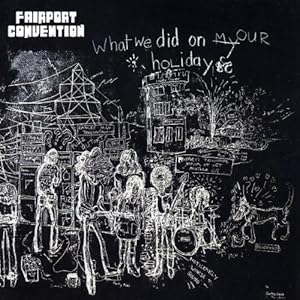Fairport
Convention was full of surprises. I grabbed their second, third and fourth
albums—What We Did On Our Holidays, Unhalfbricking and Liege & Lief, all from 1969. The first big surprise is that I
like them as much as I do, because the vocals are of a style that I’ve never
been crazy about. Sandy Denny’s singing fits in with the ilk of female folk
singers who stay mostly in the higher octaves and whose voices have a lilting
quality that calls to mind Medieval maidens and mead. I don’t hate it; it’s
just a little too pretty for me. Music has to have at least some darkness to keep me coming back to
it. Somehow Denny manages to fold a bit of evil into her pretty voice. Part of
the secret, I think, lies in the harmony vocals, sung by Richard Thompson. He
adds just the right low notes to give Denny’s voice fullness, and his voice
tucks perfectly into hers, bolsters it, never overshadows. The other factor is
the instrumentation; Fairport Convention’s arrangements are adventurous and
eclectic, woven with strands of blues, rock, raga and folk melodies from all
around the world, and electric guitars and full drums, and they stretch Denny’s
voice in ways that I’ve never heard Judy Collins’s voice stretched. For
instance, on the last song on side one of What
We Did On Our Holidays, a cover of Bob Dylan’s “I’ll Keep It With Mine,”
begins with an electric guitar strummed low and quietly in a way that makes you
know that the song is going to build up to triumphant heights, and it does: the
drums kick in, and the guitar and bass play harder, and Denny belts it out:
“Come on! Give it to me! I’ll keep it with mine!”
My favorite
number on that album is “Book Song.” Thompson sings lead, but not by much;
Denny is right there with him through every note. The melody is a masterpiece,
drawn out almost to the point of being epic, and their voices are bolstered by
wide-ranging sounds: a bit of sitar here and there, some violin, a tape of an
electric guitar solo played backward and forward, a gentle swell of organ at
the end. Their music becomes more adventurous across the arc of the three
albums. The second to the last song on Unhalfbricking
is an
eleven-and-a-half-minute adventure that begins sort of like a British or Celtic
folk tune and builds into a fulsome jam with violin, thick bass and electric
guitar with a raga flair. This roaming track seems a precursor to the third
record, Liege & Lief, which,
unlike the others, has no covers of songs by American folks artists such as
Dylan. The roots here all dig deep into the British Isles, all punched up with
modern amplification and attitude, all adorned with Denny’s beautiful voice,
and the result is quite unlike any other I’ve ever heard. It’s got the mellow I
was asking for, but it also has the complexity I need to keep me coming back to
it.




No comments:
Post a Comment